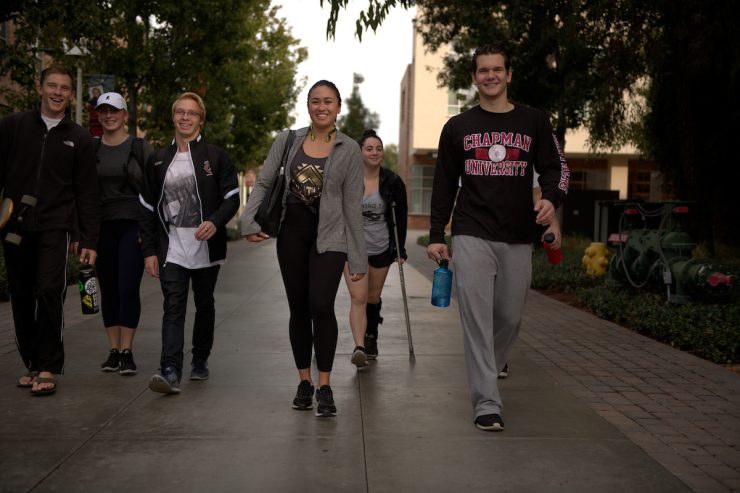The opportunity to meet people and make new friends is one of the most exciting things about starting college. It can also be one of the most intimidating!
Meeting people is definitely not a problem. From your first roommate to people in your dorm to classmates to coworkers at your campus job, college provides a never-ending parade of new faces. The challenge, however, is how to turn those acquaintances into real friends.
As a college student, the need for connection and social support is more important than ever. But many young adults find it hard to make friends as they adjust to the demands of college life and living away from home for the first time. Introversion and social anxiety can make finding new friends feel overwhelming. A 2017 survey of nearly 48,000 college students reported that 64% said they had felt “very lonely” in the previous 12 months.
Good friendships don’t just happen. In fact, another study shows that people who depend on luck or chance to find friends are more likely to be lonely five years later. However, those who intentionally set out to make friends are more likely to have strong relationships down the line.
So how can we overcome our anxieties and become more intentional about making new friends in college? Here are some ideas that can help!
Step One: Join a Club

“Research shows that if students are more involved, they are more satisfied with their college experience,” says Kayla Wiechert, a program specialist in Chapman University’s Department of Student Engagement.
Colleges and universities offer many opportunities for social interaction, with clubs, associations and organizations that serve a wide range of interests and affinity groups. Service organizations, religious groups, hobbies, academic clubs — the list is endless. “It scaffolds a student’s education,” says Wiechert. “Students go to class and they hopefully engage with their coursework and with faculty members, but clubs reinforce what’s learned in the classroom and give them opportunities to use those lessons in a deeper way.”
Sometimes, there might be too many choices — how do you find the one that’s the best fit for you? If the choices seem overwhelming, someone at the dean of students office might be able to help. Chapman University offers peer counseling services to help students learn about and connect with different student organizations, an extra boost for anyone who needs it.
Step Two: Attend (at least) Three Times
It’s not unusual to feel awkward and out of place the first time we attend a new group. Those feelings can color the experience and make us reluctant to try again. But, just like when we were kids, we’re most likely to become friends with the people we spend the most time with.
“You have to see people over and over again,” says Danielle Bayard, a friendship coach and author. “That way, you can remember what you talked about the week before and bring it up again. That’s how we build a relationship.”
Commit to attending at least three meetings or events with a new social group. Each time you go, you’ll feel like less of an outsider and more like one of the gang.
Step Three: Put Down the Phone

Phones are a security blanket in awkward social situations. Many of us depend on them to make us feel less alone when we’re on our own. But they can also prevent us from making face-to-face connections with the people around us.
If we’re busy texting and scrolling, we might not notice someone trying to get our attention. We’ll also miss out on the social interactions taking place around us, heightening feelings of isolation. Even just leaving your phone visible can hamper your ability to make deeper connections.
When we put our phones away, we signal that we’re engaged and interested in what’s going on around us.
Step Four: Introduce Yourself
Just being present isn’t enough to start making connections with people. Introducing ourselves opens a door to further conversation and the possibility of new friendships.
While it can be tempting to wait for someone else to introduce themselves first, keep in mind that they are probably struggling with the exact same anxieties. If we don’t take the first step, they might not either, and our opportunity to make a new friend will be gone.
Introductions don’t need to be complicated. This isn’t a job interview so we don’t need to share a biography or resume, but including a small detail about ourselves can help form connections. Try something like, “Hi, my name is … We have biology together,” or “This is my first Spanish Club meeting.” This gives a small opening for conversation to start.
Step Five: Prepare for Small Talk
No one really likes small talk, but it helps to have a few conversation-starters ready to pull out. Big friendships usually begin with small talk, according to Psychology Today. That doesn’t mean you have to talk about the weather.
Some ideas for small talk include:
- Pay a compliment. Praise someone’s contribution in class or something they’re wearing.
- Ask a question about an assignment, instructor or upcoming campus event.
- Say something about the location. Are there any interesting features or artwork? Is it too crowded? Too far from the dorm?
- Talk about something fun you’re planning to do — a movie, a trip to the beach, an upcoming project.
- Ask for recommendations about shows to binge. This is a great way to let the other person open up about something they’re passionate about.
- Share a funny experience you had recently.
- Talk about stress and studying — that’s something everyone can relate to!
Remember to keep questions open-ended, so they can’t be answered with a simple yes or no: instead of “Did you have a good weekend?” ask “What did you do last weekend?”
Making friends in college doesn’t have to be hard, but it does take the right mindset and a little initiative. Be proactive and don’t be afraid to reach out — your social calendar will be full in no time!




